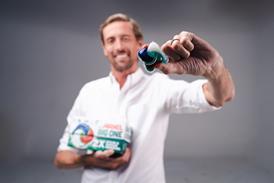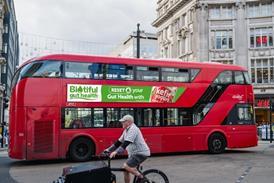The burning topics in the c-store industry were thrashed out at
the C-Store Champions' Survive and Thrive debate
The Information for Independent Retailers area played host to the
C-Store Champions' Survive and Thrive debate, where the lively discussion saw independent retailers, suppliers and the ACS' James Lowman thrash out hot topics such as tobacco legislation, local sourcing and community retailing.
Lowman kicked off the proceedings by highlighting the key influences on the convenience sector over the coming years - from the Competition Commission inquiry drawing to a close, to potential weakening of the planning hurdles that supermarkets are put through when they want to develop out-of-town stores, and the possibility of tobacco products being forced out of sight at the point of sale.
The latter sparked much debate among the audience, along with other tobacco-related issues such as the mooted ban on packs of 10 cigarettes and tobacco licensing. Jeremy Blackburn, Gallaher communications manager, told the room that a government consultation into tobacco point of sale will kick off in May for three months.
Blackburn added that tobacco licensing could include a three strikes and you're out policy, banning retailers who fail three test purchases from selling cigarettes. He also highlighted the negative impact a ban on 10s could have, saying it may increase smoking in some adults who buy 10s as a way of cutting down, or it could increase the problem of counterfeit and contraband cigarettes in the UK.
Londis retailer Barrie Seymour responded by saying that banning 10s in his store has put a stop to a problem he was having with youths at his store. "We were having problems with children trying to buy cigarettes and hanging around outside the store, so we banned 10s four months ago and now don't have those problems - and we've seen 30% growth on 20s. Other customers think we are doing a very good job for the area and we've talked to the children direct who say they would rather spend £5-£6 on a mobile top-up than on cigarettes."
Londis retailer Raj Chandegra raised the notion that if tobacco products are forced under the counter, it could create an opportunity to display other products that might generate impulse sales, but fellow Londis retailer Atul Sodha said putting tobacco under the counter could feed the criminal element.
Nisa retailer Kishor Patel moved the debate on to the lack of practical support for independents and the importance of finding a means of sharing best practice among the sector.
He also said retailers needed to analyse their costs and margins much more frequently. "That's always left on the back burner, but it's crucial," he said. "You have to involve the staff around you because they need to be fully aware of the cost and profitability of the business."
Londis retailer Steve Bassett warned that retailers need to balance the demands of studying their operations in detail with the need to always be friendly to the customer, while RedOrange retailer Nigel Dowdney highlighted the importance of offering a point of difference from the multiples, and how locally sourced products and working with the local community can offer that.
Raj Chandegra responded by voicing the problems retailers in city areas face in finding local suppliers.
Six points were raised that could ensure the future of the independent retailer. These were:
Get involved with lobbying on issues such as planning and tobacco
Create points of difference within the community and earn the status of 'community retailer' every day
Forge stronger relationships with wholesalers and suppliers and demand more support from them
Offer training and involve your staff in the day-to-day business of analysing sales and costs
Keep reviewing your range across the store and ensure it delivers the right margins
Aim to trade like a Tesco, but with a personal touch.
the C-Store Champions' Survive and Thrive debate
The Information for Independent Retailers area played host to the
C-Store Champions' Survive and Thrive debate, where the lively discussion saw independent retailers, suppliers and the ACS' James Lowman thrash out hot topics such as tobacco legislation, local sourcing and community retailing.
Lowman kicked off the proceedings by highlighting the key influences on the convenience sector over the coming years - from the Competition Commission inquiry drawing to a close, to potential weakening of the planning hurdles that supermarkets are put through when they want to develop out-of-town stores, and the possibility of tobacco products being forced out of sight at the point of sale.
The latter sparked much debate among the audience, along with other tobacco-related issues such as the mooted ban on packs of 10 cigarettes and tobacco licensing. Jeremy Blackburn, Gallaher communications manager, told the room that a government consultation into tobacco point of sale will kick off in May for three months.
Blackburn added that tobacco licensing could include a three strikes and you're out policy, banning retailers who fail three test purchases from selling cigarettes. He also highlighted the negative impact a ban on 10s could have, saying it may increase smoking in some adults who buy 10s as a way of cutting down, or it could increase the problem of counterfeit and contraband cigarettes in the UK.
Londis retailer Barrie Seymour responded by saying that banning 10s in his store has put a stop to a problem he was having with youths at his store. "We were having problems with children trying to buy cigarettes and hanging around outside the store, so we banned 10s four months ago and now don't have those problems - and we've seen 30% growth on 20s. Other customers think we are doing a very good job for the area and we've talked to the children direct who say they would rather spend £5-£6 on a mobile top-up than on cigarettes."
Londis retailer Raj Chandegra raised the notion that if tobacco products are forced under the counter, it could create an opportunity to display other products that might generate impulse sales, but fellow Londis retailer Atul Sodha said putting tobacco under the counter could feed the criminal element.
Nisa retailer Kishor Patel moved the debate on to the lack of practical support for independents and the importance of finding a means of sharing best practice among the sector.
He also said retailers needed to analyse their costs and margins much more frequently. "That's always left on the back burner, but it's crucial," he said. "You have to involve the staff around you because they need to be fully aware of the cost and profitability of the business."
Londis retailer Steve Bassett warned that retailers need to balance the demands of studying their operations in detail with the need to always be friendly to the customer, while RedOrange retailer Nigel Dowdney highlighted the importance of offering a point of difference from the multiples, and how locally sourced products and working with the local community can offer that.
Raj Chandegra responded by voicing the problems retailers in city areas face in finding local suppliers.
Action points
Six points were raised that could ensure the future of the independent retailer. These were:
Get involved with lobbying on issues such as planning and tobacco
Create points of difference within the community and earn the status of 'community retailer' every day
Forge stronger relationships with wholesalers and suppliers and demand more support from them
Offer training and involve your staff in the day-to-day business of analysing sales and costs
Keep reviewing your range across the store and ensure it delivers the right margins
Aim to trade like a Tesco, but with a personal touch.





















No comments yet